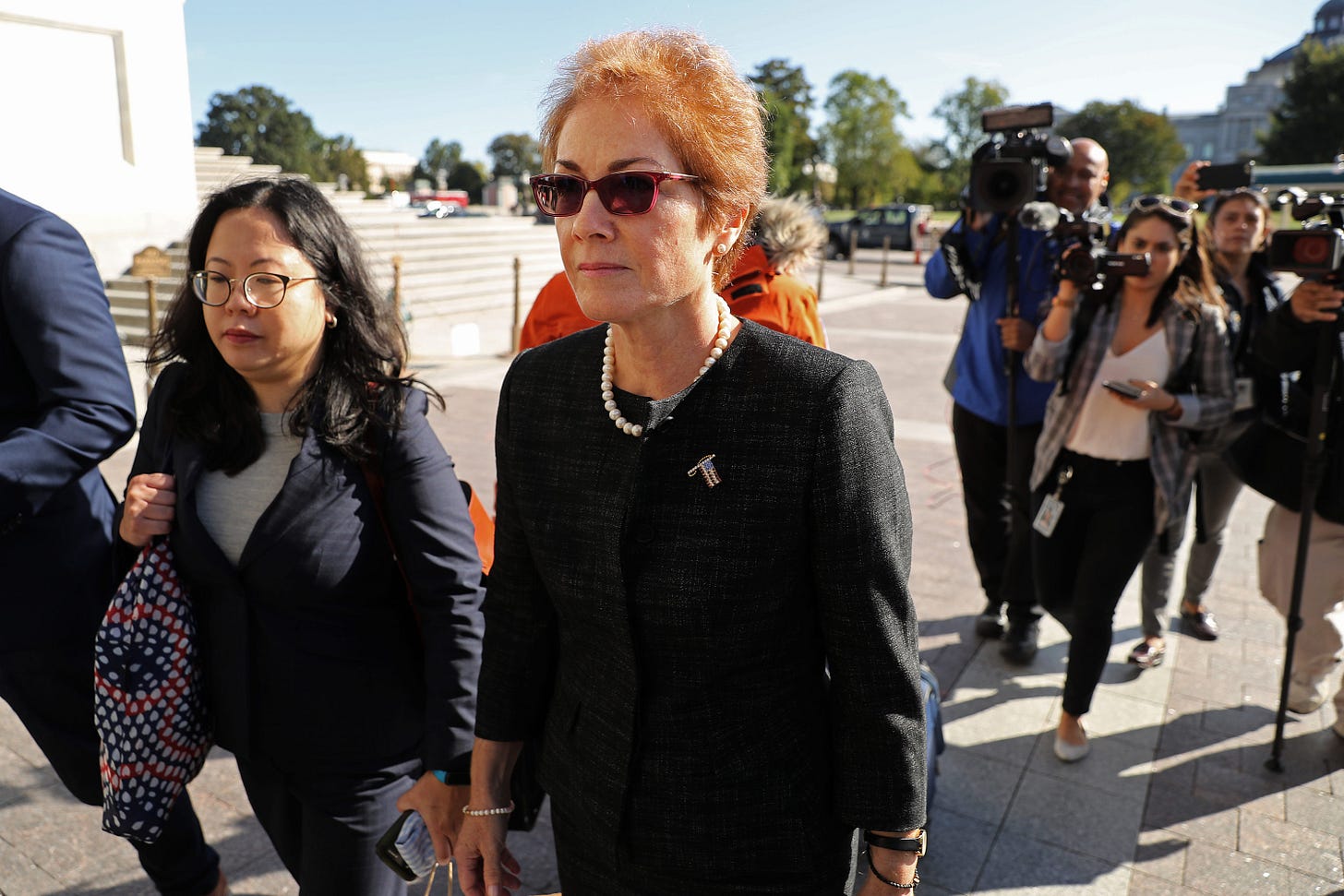What to Watch for in Today’s Impeachment Hearing
An ousted ambassador will share her disturbing story—while Trump’s defenders will try to muddy the waters.

For House Democrats, Wednesday’s opening act of the public impeachment hearings did at least two things that needed to be done.
First, in tag-team fashion, U.S. acting ambassador to Ukraine Bill Taylor and another high-level career diplomat, George Kent, laid out the case for why Ukraine is strategically significant for the United States and for the sake of democracy around the globe. Situated between Western Europe and Russia, Ukraine is stuck in a tug-of-war between oppression and freedom, with Vladimir Putin salivating at the prospect of gobbling up more than just Crimea, the portion of Ukraine he invaded and annexed in 2014. Taylor explained that Ukrainians continue to die “every week” in the conflict with Russia, and that the nearly $400 million in military aide that the Trump administration withheld as leverage in the president’s quest for a Ukrainian announcement of “investigations” could have meant life or death for some Ukrainian people.
Taylor and Kent made plain that the aid restriction was decidedly not in the interests of the United States, which has had a many-decades-old policy of assisting Ukraine in its quest for freedom and independence. Not a single Republican disputed this as a matter of fact, policy, or rhetoric.
The second thing made clear on Wednesday is that Rudy Giuliani’s role in leading what Taylor called an “irregular” foreign policy channel that prioritized Trump’s sought-after investigations over American and Ukrainian interests was highly unusual and uniformly problematic to career State Department officials.
Predictably, congressional Republicans responded by reiterating the silly and baseless claims that Hunter Biden is the real bad guy here, that the whistleblower is in a Deep State conspiracy with Adam Schiff, that Robert Mueller’s investigation was a spectacular failure, and that Ukraine—not Russia—interfered in the 2016 presidential election. The sad reality is that right-wing media outlets are spreading these false narratives across the airwaves and the internet. Millions of Americans believe them in their bones.
Somewhat surprisingly, Republicans finally attempted to mount a defense on the facts. Their argument is basically twofold. First, when questioning Taylor and Kent, Republican members of the House Intelligence Committee tried to suggest that Trump really cared about corruption in Ukraine, and that’s why he wanted “investigations.” Taylor and Kent were so impeccably credentialed and believable that their clear-eyed explanations of the true state of affairs in Ukraine pretty much destroyed this defense.
The second defense was that the military aid was ultimately released, so there was no harm done that warrants impeachment. Of course, attempted murder is still a crime: We’ve collectively decided that, even if a murder attempt fails, the attempt itself is the sort of behavior that causes chaos and creates an atmosphere of fear (among other problems). A president using his vast authority in ways that undermine America’s interests but entrench his power may just be another such a societal ill. Of course, whether Trump’s attempt to use his office to distort the 2020 presidential election in his favor will ultimately be punished will be for Senate Republicans to decide—and will depend on whether they can muster courage and conscience, which so far seems unlikely.
How will Democrats rebut these defenses? Today’s testimony probably won’t move the needle much.
Marie Yovanovitch, the U.S. ambassador to Ukraine from late August 2016 until May 2019, is expected to describe a “concerted campaign” against her that ended in her unceremonious ouster. She figures as a casualty of Giuliani’s push for Ukraine to announce a criminal probe into a Democratic front-runner for president, Joe Biden. She will also talk more about the regular and irregular lines of foreign policy toward Ukraine, the irregular led by Giuliani.
According to the July 25 call notes, Trump also tacitly threatened Yovanovitch by saying she “will go through things.” Taylor was really bothered by this detail, a Trumpian ugliness that hasn’t gotten much media attention but should. If impeachment is about abuse of power, threatening career diplomats who don’t toe the line by helping the president’s personal lawyer secure his client’s power in the next election is scary stuff. Taylor is right to call Trump’s talk of Yovanovitch the most disturbing part of the call summary.
If today goes like Wednesday, a likely gripe from the Republicans will be that Yovanovitch didn’t talk to the president directly, so her knowledge of why the security assistance was withheld is ill-informed and second-hand. But this refrain won’t last for long—because next week, we will hear from Lt. Col. Alexander Vindman, a National Security Council staffer who was on the infamous July 25 call. More importantly, the U.S. ambassador to the European Union, Gordon Sondland, will testify. The record so far indicates that Sondland spoke to Trump about the quid pro quo more than once.
If this were a criminal investigation, prosecutors would be feeling pretty good about their case. But we are not in a courtroom where facts are facts and consequences are consequences. Indeed, given some of the Republican antics in recent days, you could be forgiven for wondering whether we’re even in the real world anymore.


